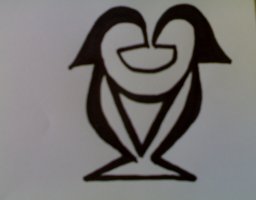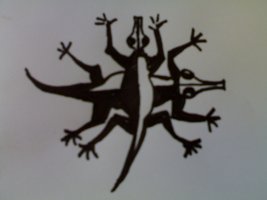January 2011

Endimi elima emparangwa etaha. (Haya)
Kila mtu ana kipawa chake. (Swahili)
Chacun a son propre talent. (French)
Individuals have different talents. (English)
Background, Explanation, Meaning and Everyday Use
It is well known that everybody is unique; even identical twins are not exactly alike. There is a saying: intelligence is like hairs — everybody has her or his own. This Haya Proverb in Tanzania teaches that talents can be compared with a garden. Its beauty depends on the varieties of the flowers planted and also the care taken, e.g. irrigation, weeding, killing harmful pests, etc. God is the gardener and giver of talents. Everybody is in charge of her or his own and of others. We work together to make the world a beautiful place to live in. We decorate the world with our differences. Everybody has to know which part to play in life according to the talents one had been given and the continuance of them. The work done will be measured by God who knows what each one is supposed to fulfill in life. Everybody has a mission.
This kind of teamwork belonged to, and was deeply rooted in, African societies starting with ethnic groups: the way of paying respect to their ancestors; in e families who was supposed to doing what, when and where. The communal life helped to strengthen one another’s talents and well organized communities (kingdoms).
As time went on, priorities were given to money, power and competitions that led many African countries to corruption that they call development or modernization, but in reality is losing their direction and identity. Many African people have been educated in different fields. How is this education applied to help the better educated to use their talents? Instead there is money, witchcraft and bribery that destroy education. The worst thing is that people are looking for positions for which they have no skill. The country that is not aware of these things works with artificial doctors, nurses, lawyers, teachers, etc. and we call this “modernization.”
Biblical Parallels
 In God we find the good order of doing things. The Trinity: Each person has a job in the ONE GOD who is the first family, the Holy One (the beginning of small Christian communities). There is no competition in the three Persons of the One God. This is our example because God said, “Let us make man in our image” (Genesis 1:26). If our work is not to bring unity, charity and justice whatever we do is useless. We are the image of God; let us work together for unity. God’s Spirit enables us to call God our Father who gives talents for the good of all (sharing).
In God we find the good order of doing things. The Trinity: Each person has a job in the ONE GOD who is the first family, the Holy One (the beginning of small Christian communities). There is no competition in the three Persons of the One God. This is our example because God said, “Let us make man in our image” (Genesis 1:26). If our work is not to bring unity, charity and justice whatever we do is useless. We are the image of God; let us work together for unity. God’s Spirit enables us to call God our Father who gives talents for the good of all (sharing).
The Spirit gives one person a message full of wisdom (Solomon in 1 Kings 3:16ff) while to another person the same Spirit gives a message full of knowledge (David in 2 Samuel 1:1-4, 12). One and the same Spirit gives faith (Abraham in Genesis 22) to one person while to another person God gives the power to heal. The Spirit gives one person the power to work miracles (Moses in Exodus 4:4), to another the gift of speaking God’s message (St. Paul) and to yet another, the ability to tell the difference between gifts that come from the Spirit and those that do not (the prophets). To one person God gives the ability to speak in strange tongues and to another God gives the ability to explain what is said. But it is one and the same Spirit who does all this as God wishes. The Spirit gives a different gift to each person for the good of all to build the Body of Christ, the Church and the family of God. The whole Chapter 12 of the First Letter to the Corinthians speaks and directs us how we must live. There should be kings and servants, doctors and attendants. Why then do we “buy” jobs?
We read also in 1 Peter 4:10-11: Each one of you has received special grace (talent) so, like good stewards responsible for all these different graces of God, put yourselves at the service of others. If you are a speaker, speak in words which seem to come from God (Julius K. Nyerere). If you are a helper, help as though every action was done at God’s orders (Blessed Mother Theresa of Calcutta). Live and act so that in everything God may receive the glory through Jesus Christ who is in you.
Contemporary Use and Religious Application
This Haya proverb Endimi elima emparangwa etaha teaches that individuals have different talents and societies should adhere to the saying that We are what we are through others. Nobody is independent. Everyone has a position in life to fulfill. It is important to recognize one’s ability when applying to any given position and to thank God for what you can accomplish in life.
Also one has to be aware of the prophecy of Micah in Chapter 7:2-5, 7: “There is not an honest person left in the land, no one loyal to God. Everyone is waiting for a chance to commit murder. Everyone hunts down their own people. They are all experts at doing evil. Officials and judges ask for bribes. The influential people tell them what the want, and so they scheme together. Even the best and most honest of them are as worthless as weeds.” The day has come when God will punish the people as he warned them through their watchers, the prophets: “But I will watch for the Lord. I will wait confidently for God who will save me. My God will hear me.”
This Haya Proverb presents many challenges to African people and to African society.
Sister Rita K. Ishengoma, STH
Msimbazi Center
P.O. Box 2428
Dar es Salaam, Tanzania
Cellphone: 0755-551735
Email: srkoku@hotmail.com
Professor Cephas Yao Agbemenu
Department of Fine Arts
Kenyatta University
P.O. Box 43844
Nairobi, Kenya
Cellphone: 254-723-307-992
Email: cyagbemenu@yahoo.com

